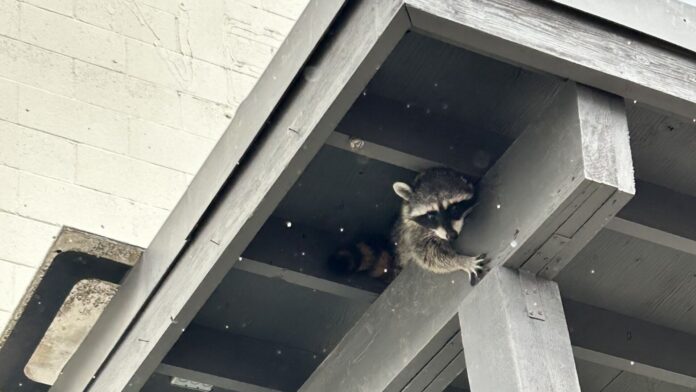With spring in full swing, many are eager to tackle spring yard cleaning. However, while the focus may be on trimming bushes and clearing brush piles, the BC SPCA reminds you to be on the lookout for animals that could be denning on your property.
Nadia Xenakis, BC SPCA Wildlife Welfare Specialist, says there are a few proactive steps residents can take to ensure their spring cleaning doesn’t disturb any wildlife.
“A lot of us are getting excited to start gardening and preparing our outdoor spaces, and sometimes animals like birds, rabbits, or even squirrels can be nesting in our backyards, and we might not even notice immediately.”
Trimming Trees
Xenakis notes that when trimming trees and hedges, residents should be sure not to disturb any bird nests that could be hidden among the branches.
Birds’ nests, in particular, can be tricky to spot; for instance, hummingbird nests can be as tiny as a toonie.
“Sometimes bird nests can be very tiny. They can be hidden in bushes or under leaves. So if you’re thinking about pruning or cutting down branches, maybe just do a quick check to see if there are any bird nests before you cut anything down that wouldn’t need to be reattached or rescued afterward.”
The BC SPCA encourages tree trimming to be done before April, if possible, or after August, to avoid peak nesting and breeding seasons.
Mowing Lawns
Before mowing tall grass for the first time this season, Xenakis says residents should take a walk around their property and look for areas that have been undisturbed up until this point, as they are prime nesting spots for shy cottontail rabbits.
“Before doing a big mowing of your lawn, if it’s been a long time since the last time you’ve done it, maybe just do a quick check to see if there are any nests or burrows from Eastern Cottontail rabbits before you start.”
Cottontails make a shallow depression in the ground where they give birth to their babies, and they rely on grass cover to keep the nest hidden from predators. The first round with the lawnmower can remove this protective shield and even injure the young rabbits.
She adds that you should also check brush piles before moving them around, as there could be animals inside who may be denning or have created a nest in that area.
“Just be very mindful of moving things around outdoors. If it’s been quite a long time, there might be some animals that have moved in and are planning to have their babies there.”
Repairing Holes
Xenakis says spring provides an opportunity to address any areas on your property where human-wildlife conflict has arisen in the past.
“If you’ve had conflicts with raccoons, coyotes, skunks, or other animals that might den in outdoor areas, this is a really great time to start making sure areas are closed off so animals can’t come in to make their dens if you don’t want them to do so.”
Damage to roof shingles, vents that are stuffed with grass, or holes in house siding can all indicate that animals like raccoons or squirrels were looking for a safe, cozy place to den.
Sealing these areas off prevents families from moving in.
However, before making any repairs, check that there are no animals inside.
“If you see an adult animal frantically trying to enter a recently repaired area, that’s a good sign that a mother is trying to reach her babies,” Xenakis explains.
“Be aware of your surroundings. Do a check for wild babies, and also put in some exclusion work to prevent denning if that’s not something that you want on your property right now,” she adds.
Encounters
If you do find babies denning on your property, she says to leave them be and give them lots of space. Ensure any pets are kept away from the area.
“Unfortunately, cats can act as predators for wild babies. Dogs can accidentally injure wild animals or wild babies, so make sure to give them lots of space. Then wait until the babies are grown and leave the area. If you know this could be a problem in future years, you can remove access to that area to prevent it from happening again.”
If you have any concerns about animals denning on your property, the BC SPCA highly recommends calling an accredited pest control company that will help gently haze the animals away from the area if it’s safe, taking extra care not to separate mums from their offspring.
Lastly, if you come across any injured wildlife, Xenakis urges you to call your local wildlife rehabilitation facility, or the BC SPCA Animal Helpline at 1-855-622-7722. They can help connect you with a wildlife rehabilitation facility or guide you on the next steps.
Want to get your business noticed? Have you considered advertising through your local radio station? Speak to one of our sales agents and find out how radio advertising can boost your business today. Call 250-358-1902 or email Vista Radio.





